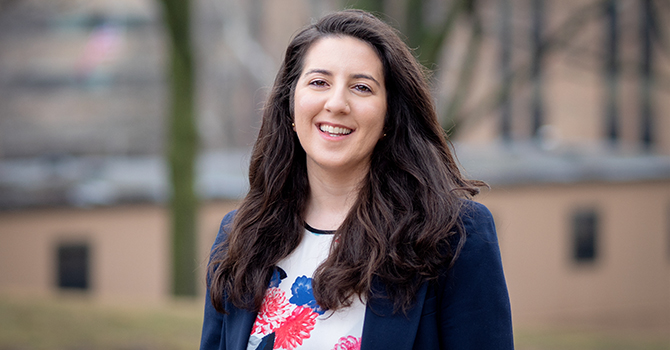Future Biostatician Discovers a Passion for Environmental Impact

Candice Ammori
Master’s Student in Biostatistics, Richard G. Cornell Scholar
I am the youngest in a family of Wolverines. All four of my siblings and I attended the University of Michigan, and I am the third to pursue a graduate degree here. I was four years-old when we dropped off my oldest brother in Ann Arbor, and he was still in residency when I started undergrad over a decade later. At an awards reception during my last year of undergrad, my mom jokingly suggested to then-university president Mary Sue Coleman that we should have received a buy-four-get-one-free discount on tuition.
Although neither of my parents attended college, they emphasized the value of education. My parents immigrated to Detroit from their rural Christian village in northern Iraq. I grew up in a Metro-Detroit community of immigrants and first-generation Americans like myself. I was greatly impacted by the example of these entrepreneurial, resourceful and community-focused individuals.
Throughout my varied work and educational experiences, a common thread has been my love of big ideas, guided by my interest in diverse cultures and a desire to make a positive impact on people’s lives.
As an undergraduate, I studied Public Policy with a focus in the environment. As part of the sustainability-focused Graham Scholarship, I had the opportunity to travel with faculty to Kenya, China, and Mexico. This international research opened my eyes to the possibility of doing global work for a good cause after graduation. I lived and worked in Asia for three years, first in Singapore teaching business and then in Cambodia working at a microfinance start-up.
My time in Asia helped me see that the world is much smaller and more connected than I had originally imagined. The everyday issues and concerns people had across the world were no different than the ones my family and friends have. After returning to the US, I spent time in Detroit and New York City working in the tech industry before deciding to return to school. In both of those cities, I was constantly inspired by smart people pursuing big ideas.
Whether that requires working to develop new technology, pursuing entrepreneurship, or joining the sustainability workforce, I'm excited for the challenge and know the skills I've developed in the Master of Science program here at Michigan Public Health will strengthen whatever sustainability-related work I do in the future.
My experience in tech also taught me that the algorithms integrated into our lives, from whether we might receive a loan to whether a judge might give someone parole, are not always “fair.” This is because data used in most computational settings today is observational data, meaning they’re not derived from clinical trial—like what you encounter more often in biostatistics settings—and they carry many biases inherent to the setting in which it was collected. Computational statistics can reinforce the bias in already biased data. Learning about this made me want to understand the math behind the algorithms we use, and I decided the best way to do that was to pursue graduate studies in statistics.
I returned to Michigan to enroll in a year of pre-requisites in math and electives in computer science to make sure I would be ready for the rigor of a statistics program. At the same time, I began researching with MiCHAMP, a group of researchers from medicine, engineering, and other disciplines on campus who use data science and machine learning techniques to solve real-world healthcare problems. After this year of research and coursework, I chose the biostatistics graduate program at the School of Public Health because I believed that it would prepare me to have the most direct impact on people's lives.
As a graduate student here, I'm grateful to be a Dow Sustainability Fellow. Alongside other Michigan graduate students, I participate in a substantial interdisciplinary team project around sustainable opportunity zone development. Being a part of this program and being near the Michigan Public Health’s Environmental Health Sciences department has encouraged me to explore how I can use the statistical skills I’m learning in the biostatistics program toward climate change and sustainability goals. While algorithms and tech may not reverse climate change, I believe it will be integral to adapting and mitigating future damage.
I believe that one of the best uses of my skills and greatest impact I can have on human health is related to sustainability. Between now and graduation, I plan to take spatial statistics and other technical courses especially suited for making an environmental impact. I hope to connect with more students and faculty in different fields, like environmental engineering, to discover how to best apply my skills with others in climate and tech-related fields. Whether that requires working to develop new technology, pursuing entrepreneurship, or joining the sustainability workforce, I'm excited for the challenge and know the skills I’ve developed in the Master of Science program here at Michigan Public Health will strengthen whatever sustainability-related work I do in the future.
